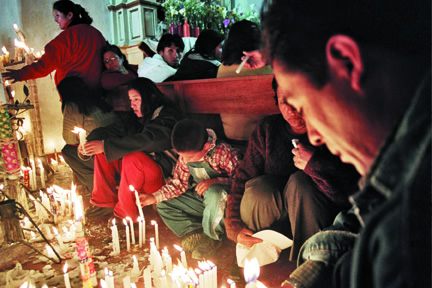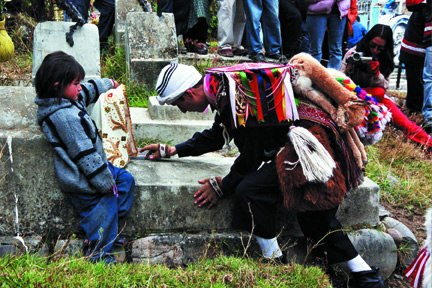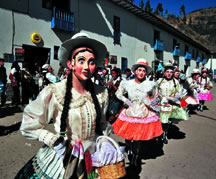Living Festivals Abroad
How to Get Into the Local Spirit
Article & Photos By Jim Kane

|
|
Families pray in a packed church
during Paucartambo's annual celebration in honor of
the Virgin of Carmen.
|
Mangueira! The shout rose
toward us through the dense crowd of Cariocas spilling over
the sidewalk and into the street parade. My friend Michael
and I were in the middle of it, being swept up by the tide
of people in the Ipanema district of Rio, enjoying the city's
world-famous Carnival.
"Mangueira!" This
time I spotted the Brazilian couple waving to us, calling
us over to their sidewalk table outside the popular Sindicato
do Chopp beer parlor. They had spotted our bright pink and
green shirts, with the name of one of the city's most beloved
samba schools emblazoned prominently across the front.
Subtle the shirts were
not, but then again neither is carnival. Plus, we wore them
for a good reason. Before this trip, I had read Alma Guillermoprieto's
book Samba, which describes the devotion the city's favela
residents have for their beloved samba schools. Each favela
will spend months of preparation on the theme and choreography
and each participating resident will spend months of hard-earned
wages constructing the elaborate costumes needed to compete
in — and win — the samba school parade during the
week-long fête. Reading Guillermoprieto's book converted
me into a fan of Mangueira, one of the perennial carnival
samba school contenders.
On this night, our recognizable
garb and knowledge of the Mangueira samba school served
as our access pass to the local side of one of the world's
most passionate public events. We received invitations for
beer and spontaneous samba lessons as a band of musicians
passed through the street. It was the catalyst for a spirited
conversation with a couple of friendly Cariocas, made all
the more lively by our forced mix of Spanish, Portuguese,
and English.
Local festivals are a
highlight of almost any trip abroad for those lucky enough
to plan their visit around one, or just to stumble onto
one by chance. These celebrations offer drama, beauty, energy,
and, above all, open a doorway into the living culture of
the place you're visiting. With research and careful preparation,
you can increase your odds of passing through that doorway,
into the local side of the celebration.
The following ideas may
help in making the transition from observer to participant,
in a way that both you and your hosts will appreciate.
Know Before You
Go
Before traveling to participate
in a festival, you should research the customs, history
and importance of the event in its current cultural context.
This is critical if you are to understand the expectation
for behavior and dress that guide the festival. Knowing
the meaning and purpose of the celebration within the culture
will also make it more personally enriching.
Arrive Early
If you have time, arriving
to town a few days before the celebration begins is a great
way to acclimate to the rhythm of the place. It provides
a unique perspective on the preparation process, which is
often as important to local residents as the celebration
itself.
For the Day of the Dead
celebration in Oaxaca, Mexico in 2003, I was able to arrive
several days ahead of the main festival. As I walked through
town each day, I felt the pulse of the city start to quicken.
One of my favorite memories
of that special time was an invitation to visit my friend
Pati's mother as she prepared her famous mole, a labor of
love made only for special occasions. As we talked in her
cozy home and drank hot chocolate and ate pan de muertos
she showed me the seven types of chilies that she had just
fire-roasted to be hand ground before being combined them
with charred bread, a handful of spices, and the dozen or
so other ingredients that would be added over the course
of two days to create a rich, black, and spicy edible magic.
Although there was a lot
of work to be done, there was no hurry in her voice, only
a real desire to invite me into their world, to help me
understand that for the family, the most important part
of the Day of the Dead tradition is indeed the love with
which the ceremony is prepared. After all, the food, decoration,
flowers, and cemetery visits are all acts that unite the
family — both living and dead — for these two days
of the year.

|
|
A dancer belonging to the Qhapaq
Qolla comparsa pays an annual graveside homage to
a deceased member of the group.
|
Photograph for
Others
This works best in smaller
settings where some rapport and trust has been established
between you and a local resident or friend. It should be
clear that this advice is only for those situations where
photography is widely accepted in the first place.
Often, tourists photograph
(or video) a festival in places where access to camera equipment
is very limited. If you can form a rapport with a participant
in the festival, offer to photograph it for them. This will
allow you greater and closer access to the activities, it
will be a wonderful contribution to their festival memories,
and it will surely open the door to a friendship and connection
for the following year.
Make it an Annual
Event
Almost all aspects of
experiencing a festival like a local become easier if you
return for a second, third, or fourth time. You'll find
many advantages to indepth, firsthand experiences — from
building local friendships and trust, to knowing the best
streets or balconies from which to watch the procession,
to becoming comfortable with the social etiquette during
the festival.
In October, I'll return
to Mexico for the Day of the Dead celebration. This time, my small
group and I will build and decorate our own altar, paying
homage to our passed loved ones just as Oaxaca's residents
do. This year, returning to Oaxaca feels less like getting
away and more like coming home.
|
Join a Team

|
|
Splendid masks and traditional dances, and
the stories they depict, are highlights at
the Virgen del Carmen festival in Paucartambo,
Peru.
|
There are a several ways to
affiliate yourself as a "team member" at many festivals.
The examples I'll give are specific to Latin America.
Many celebrations have multiple
groups, comparsas, blocos, or schools, competing
for honors, popularity, and prestige. The Mangueira
story about the Rio samba school mentioned in the
article is one example, but there are many more
across the continent..
-
In Salvador, Brazil,
the city's dozens of blocos attract hundreds
or even thousands of fans, each affiliating
themselves with a specific bloco — and
allowed exclusive access to dance and party
with the group — by buying or wearing
unique, colorful T-shirts made just for the
occasion .
-
In Las Tablas, Panama,
Calle Arriba (high street) has its annual battle
of pageantry and competing street floats with
Calle Abajo (low street). The celebration gets
national, prime-time television coverage for
both its elegance and folklore. Ask any local
which team they're supporting and you'll hear
a clear answer for one or the other.
-
In Paucartambo, Peru there
are 16 or so comparsas that lead the festive
homage to la Mamacha Carmen each July. Although
they don't compete with each other, each comparsa
attracts its own supporters, drawn to what the
group represents in the unfolding history of
the festival or due to ties of family and friendship.
Over the course of four days, the comparsas
not only dance and parade together, but worship,
eat, and drink together, along with family,
friends, and sponsors, who help defray the enormous
costs of the celebration.
By learning about these different
groups, their history and their fans, and by becoming
a supporter of your favorite, you will have automatically
entered into the celebration — no longer a
passive observer but, instead, an impassioned participant.
Your enthusiasm and knowledge is sure to be appreciated
by other local fans. Don't be surprised if you're
invited to join them for drinks, food, or dancing.
|
JIM KANE has written
frequently for Transitions Abroad on travel with a community-based
emphasis. He is the founder and CEO of award-winning Culture
Xplorers, a recognized leader in sustainable travel.
|
